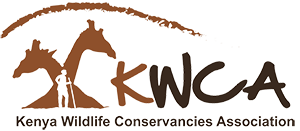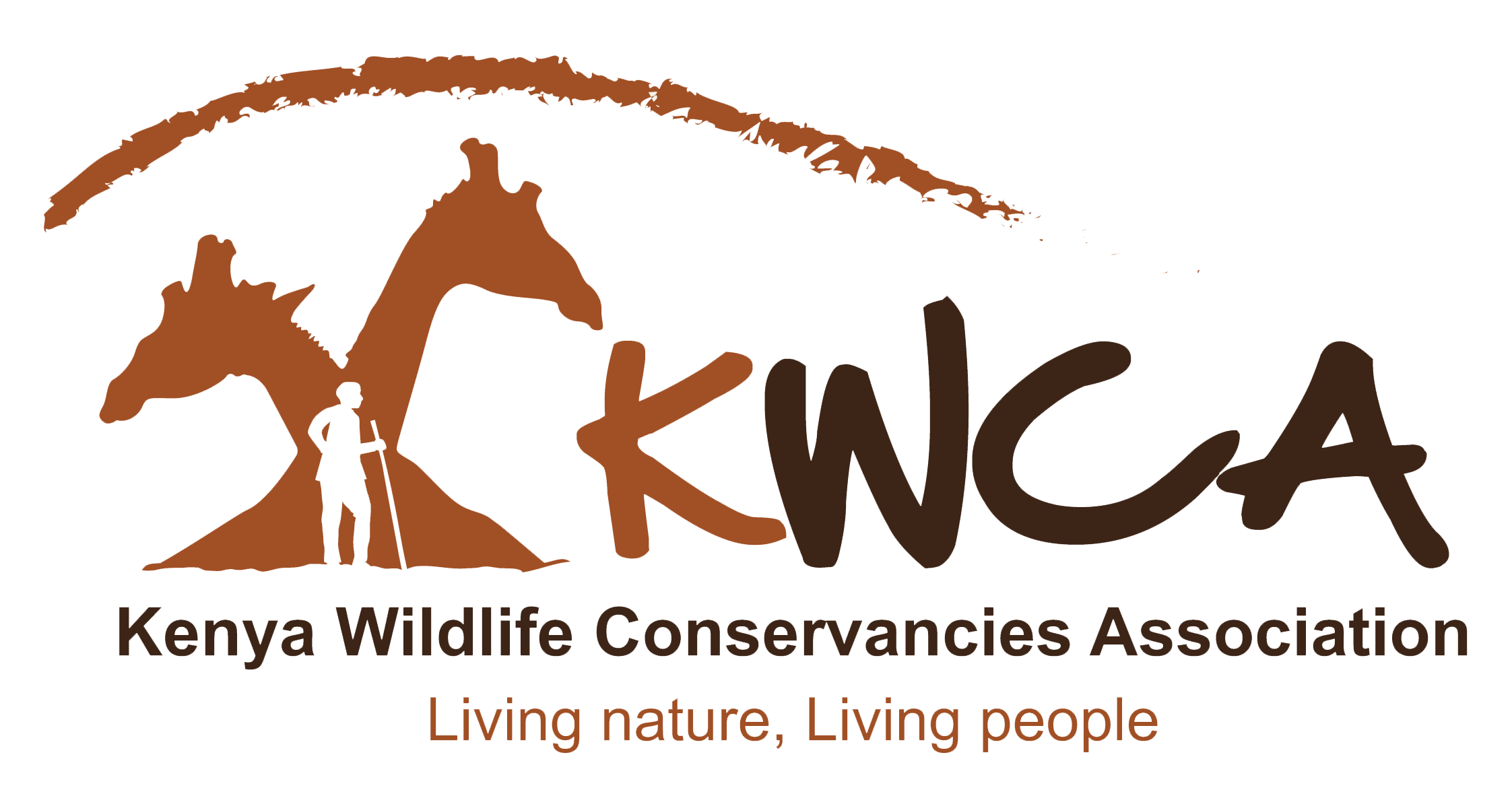KWCA at the World Conservation Congress 2025 Highlights
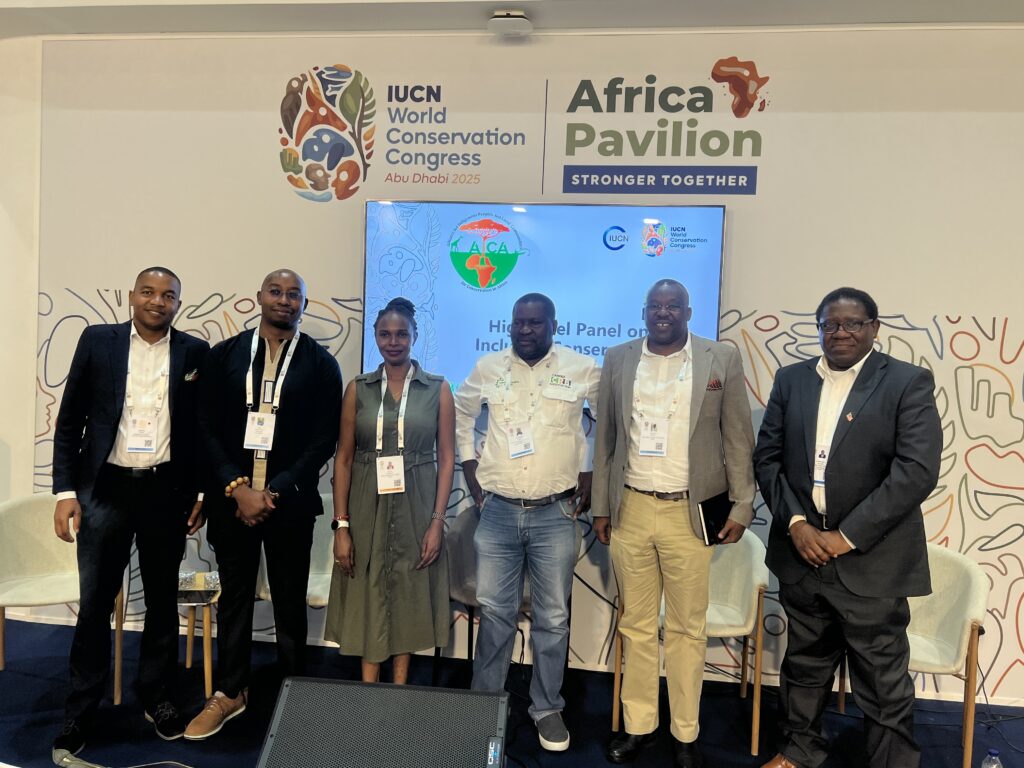
The IUCN World Conservation Congress, the world’s international event focused on nature conservation took place from 9 to 15 October, 2025 bringing together more than 10,000 attendees including decision-makers from government, civil society, Indigenous Peoples’ Organisations, academia, and business to advance and set the conservation and sustainable development agenda for the next 20 years.
Held every four years, the Congress enables IUCN’s more than 1,400 Member organisations to democratically determine the most pressing issues in nature conservation and actions to address them to help guide people’s relationship with nature.
The IUCN Congress featured the IUCN Members’ Assembly the highest decision-making body of IUCN. Members debate and vote in motions which, when adopted, become Resolutions and Recommendations, forming the core body of IUCN’s policy and programme. These decisions help drive action on nature loss and other global challenges.
For the first time, KWCA participated in the World Conservation Congress as IUCN Member no. NG/26594. KWCA was represented by its Chief Executive Officer, Programmes Manager, Communications Manager, and Senior Private Sector Engagement Officer, who participated in 12 in-person panels and contributed as panellists in discussions on key themes including; Equity and rights in conservation, Conservation financing, Community-led conservation, Equitable governance, Gender and inclusion.
KWCA extends sincere appreciation to its partners IUCN, WWF-US, and IIED for their financial and technical support, which enabled us to share Kenya’s experiences and lessons on community-led conservation in a global platform.
KWCA WCC events highlights:
Event 1: High-level Panel on Inclusive, Locally-led Conservation- Dickson Kaelo
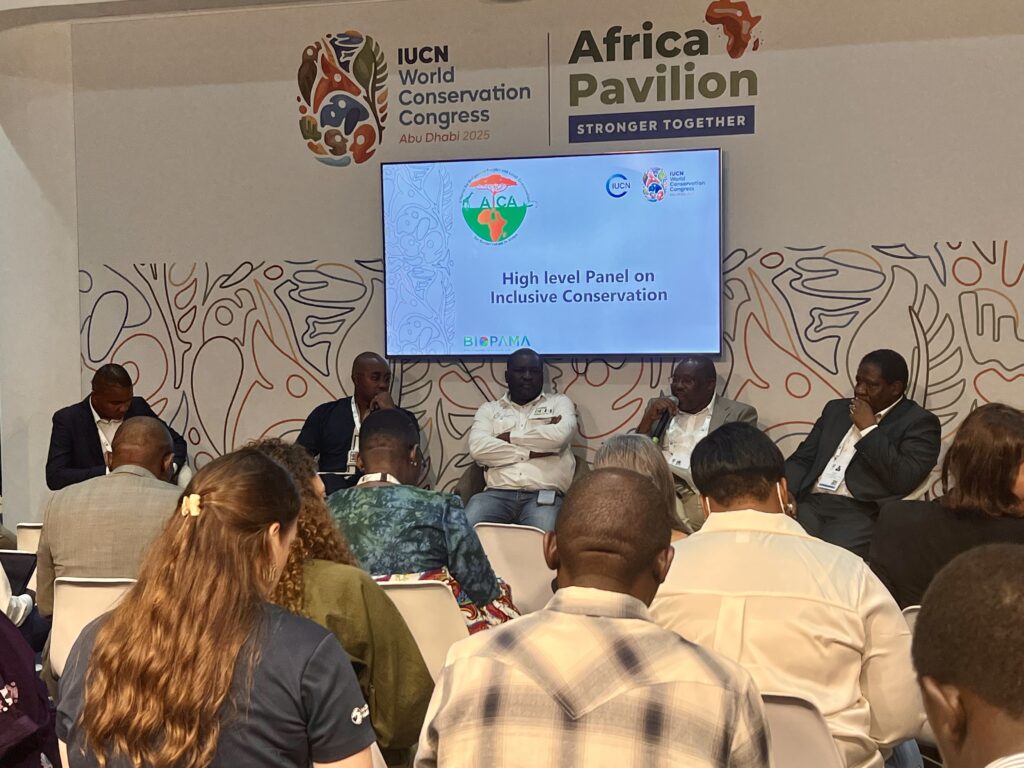
In this session, KWCA CEO Dickson Kaelo together with other African conservation leaders explored ways in which Africa would need to effectively decolonise conservation and secure the necessary rights, capacity and resources to make the transition progressive and a rights based locally led conservation model.
Dickson delved deeper into capacity of local African conservation NGOs citing lack of capacity as a barrier. “its no longer an excuse that communities don’t have capacity and therefore can only access small amounts of funds that have to be micromanaged. Communities have the structure, the tools and the governance to deliver conservation action.” He said.
Communities should also be viewed as investors, because they invest in their land, their resources, and their time in producing conservation impact. This gives community the bargaining power to exercise their right to land.
Event 2: People are Big Mammals too: Advancing Governance and Equity in Community led Conservation- Joyce Mbataru
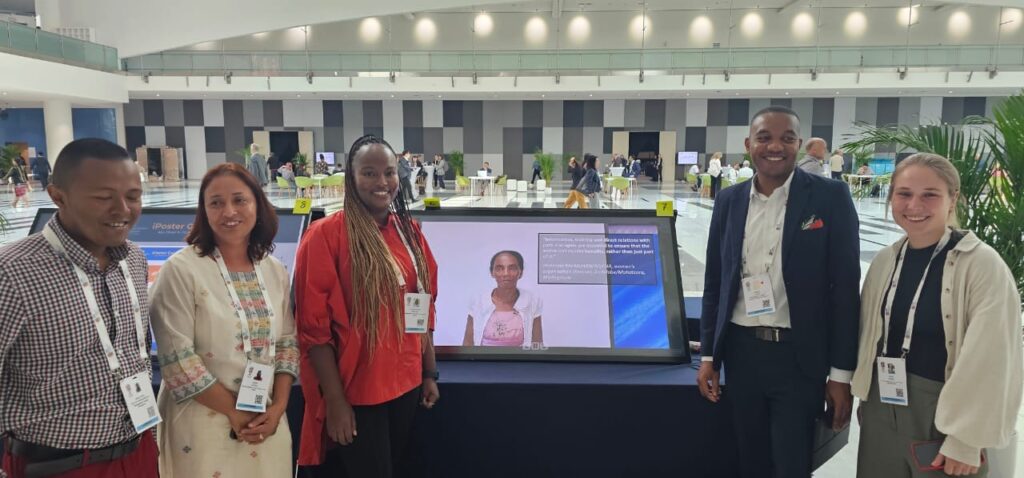
KWCA Communication Manager Joyce Mbataru together with IIED through the Scaling up Equitable Governance (SEGA) project developed an Interactive Poster (iPoster) to showcase SAGE as an effective governance assessment tool for community led conversation. The iposter contains videos, success stories, blogs and articles from SEGA implementing partners (Tanzania, Bolivia, Madagascar, Kenya and Nepal). The iposter was slotted for three presentations at the congress and is available on this link So far the #iPoster has been viewed more than 200 times by IUCN members and conservation experts.
Event 3: The African Nature-Based Tourism Platform – Lessons learned and future directions-Joshua Ayuo
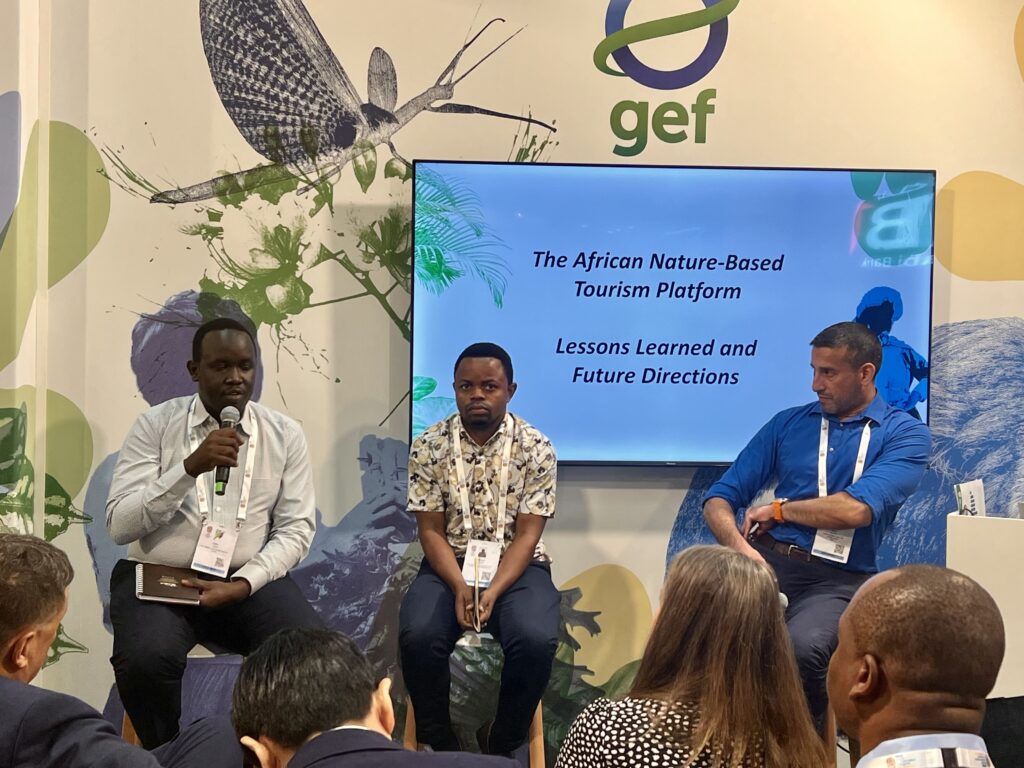
KWCA Programmes Manager Joshua Ayuo, together with the CEO of Community Wildlife Management Areas Consortium (CWMAC) Tanzania Mohammed Kamuna, shared their lessons implementing the Africa Nature Based Tourism Platform (ANBTP). KWCA shared its achievements in supporting conservancies post covid to develop other alternative income sources other than tourism by supporting them in business plans development and linking them to private investors through the Kenya Conservancies Investment Forum
The platform also supported the partners in mobilising funding through proposal development, learning and knowledge exchange in global conferences such as the New York Climate Week, Africa Protected Areas Congress and the World Conservation Congress.
Event 4: Advancing Equity and Rights in Conservation through the SAGE tool IIED SEGA Partners – Joyce Mbataru & Vincent Oluoch
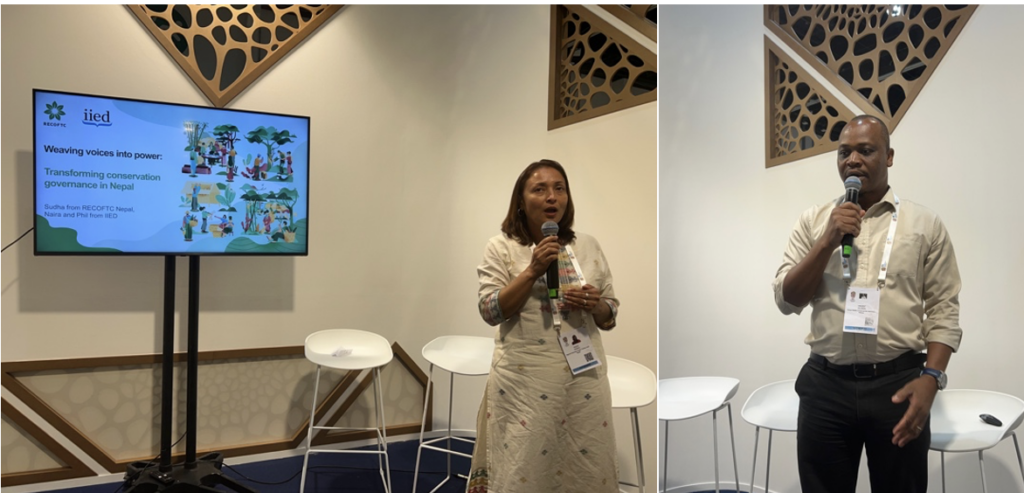
IIED SEGA partners RECOFT and KWCA shared their practical experience in implementing SAGE tool to identify key inequity issues in Kenya and Nepal equity. There are similarities on governance issues in the two contexts at the community level. However, RECOFT have advanced their advocacy at the national level ensuring equity issues are scaled in other sites with the support of national and local leaders in the management of community forests. A lesson that Kenya could pick up on.
Event 5: Connecting the dots: the multiplier effect of community led conservation- Joyce Mbataru
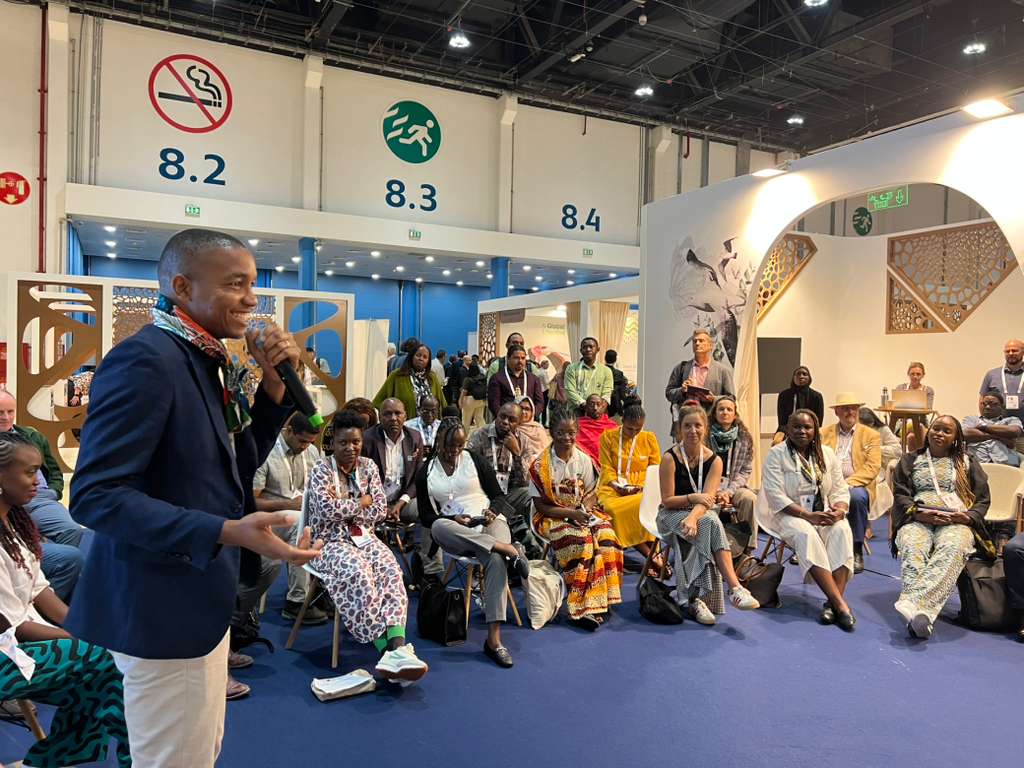
Maliasili convened its partners from Zambia, Tanzania, Kenya, Namibia, Madagascar, Mozambique, and Ghana for a powerful story telling session to demonstrate Africa’s collective impact of Africa’s leading community led conservation linking local impact to continental change. The session illustrated how collaboration across borders and ecosystems amplifies results and learning and the importance of showcasing data to make a case for financing of community led conservation.
The stories showcased connections between Honeyguide’s governance and management with WMAs in Tanzania, upscaled by CWMAC at the national level, and Tanzania learning policy advocacy efforts from KWCA. KWCA reminisced its foundation of its establishment from Namibia ‘s NACSO and IRDNC and carrying that inspiration to Uganda to support Umoja’s establishments efforts and inspiring other national conservancies associations across sub-saharan Africa to define community led conservation and its principles by those who who practice it.
For IRDNC through the Africa Conservation leadership, they connected with FANAMBY from Madagascar whom they shared rooms and learnt about each other’s work, FANAMBY is working with Madagascar national parks to conserve frogs similar to the work done by Herp in Ghana. All these partners work across 72 million hectares of land and seascape reach over 15 million people and help bring direct benefits exceeding 12 million dollars annually.”
Event 6: Barriers to shifting Power– Joyce Mbataru
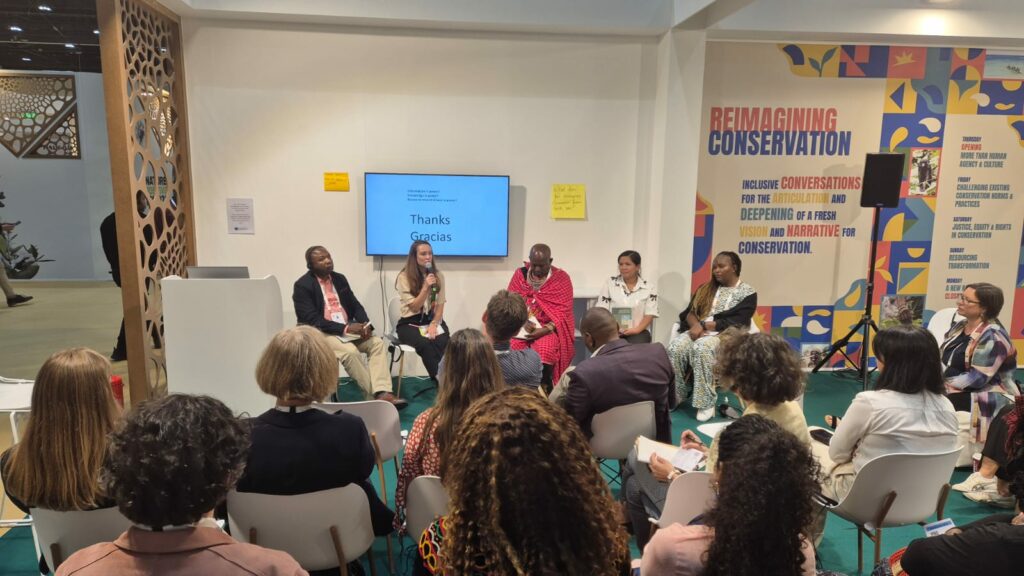
This session hosted by IIED through a joint task force between IUCN WCPA and CEESP commissions to advance indigenous and community led equitable governance sort understand the barriers to Indigenous and community leadership in conservation, and how to overcome them.
KWCA Communications Manager presented on Kenya’s advancement and challenges of conservation practice and policy in support for IPLC’s rights and recognition. Kenya has made a lot of progress with the enactment of the Wildlife Act 2013 and the Community Land Act 2016, communities have the power to own land through titling, carry out conservation as a land use and include women and youth in decision making.
However, implementation of these laws have been a barrier dues to overlapping polices that hinder communities from managing their own natural resources. KWCA is working in the policy space to advocate for the fasttracking of the Community Land Act implementation and addressing benefit sharing gaps in the distinct sectoral policies. Other barriers discussed included intergenerational gaps, land rights, genuine power transfer, values and institutions of Indigenous Peoples and local communities.
Event 7: From Local Voices to Systemic Shifts: Rethinking Finance and Partnerships for African Conservation Leadership– Vincent Oluoch
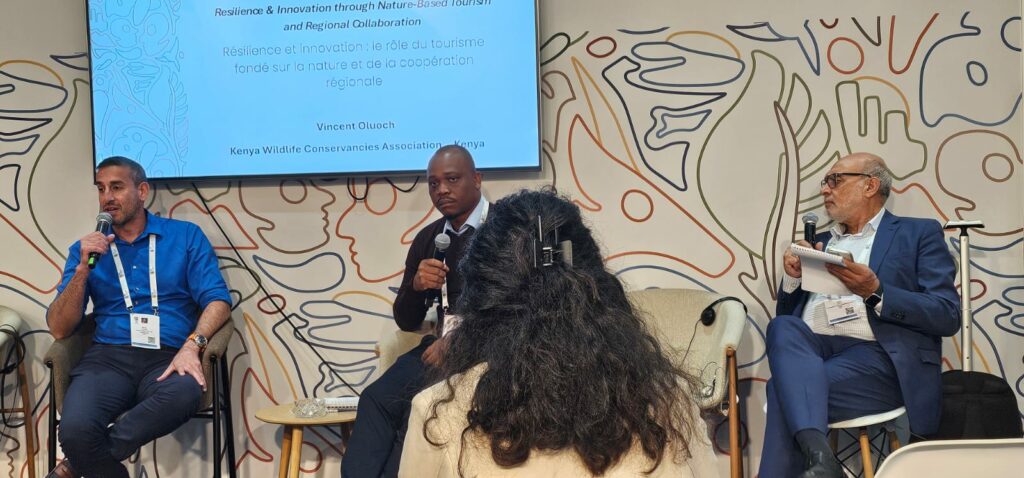
This session hosted by WWF- US through the Africa Nature Based Tourism Platform sort to explore how local conservation NGOs overcome funding barriers, how they design equitable partnerships and pioneer resilient finance models. KWCA private sector engagement officer joined other Africa conservation leaders to discuss innovative finance models and barriers limiting financing for local organisations. Vincent shared our experience on nature based tourism and how KWCA is scaling tourism models for impact.
Among the issues highlighted were short term projects engagements by donors, high competition for dwindling resources, building capacity for local CSOs to enhance staff retention, sustaining effective equitable partnerships and unlocking long term funding opportunities for local CSOs.
ANTBP supported KWCA tap into various networking opportunities, joined various proposal development trainings and data collection workshops to support conservancies address post Covid 19 pandemic by linking them to investors to explore alternative income opportunities. KWCA will explore opportunities for scale up on the impacts of the ANTBP
Event 8: Supporting rights and equity in practice: Tools for monitoring and evaluation- Joyce Mbataru
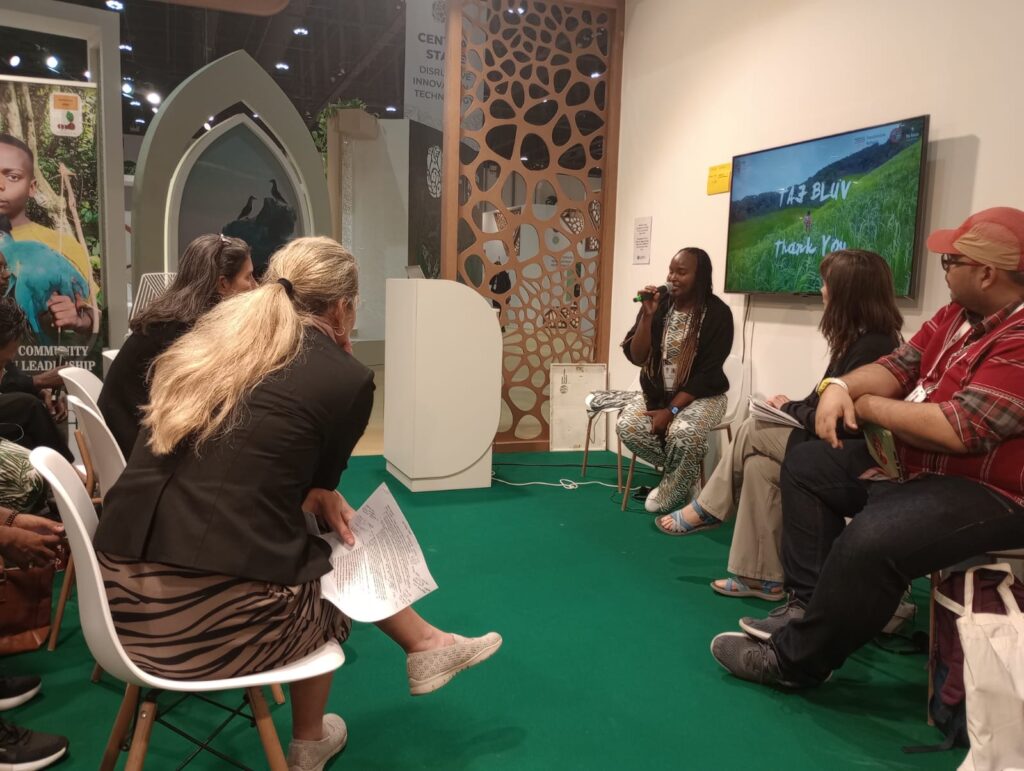
This session explored how different assessment tools used for monitoring and evaluation incorporates rights based approaches for community conservation and how these tools reduces power imbalances by engaging directly or indirectly communities and how equitable, effective right based conservation practices can be best achieved. Practical examples from indigenous communities form Peru, Thailand and Kenya were shared in assessing food security, governance autonomy and human wildlife conflict.
KWCA Communications Manager shared KWCA experience implementing SAGE and its role in addressing transparency and accountability, social exclusion, communities’ grievances and legal registration issues. Other tools presented were include; Assessing and Improving Social Equity in Marine Conservation and UNEP-WCMC green listing and PAME tools.
Event 9: Funding from the ground up session- Dickson Kaelo
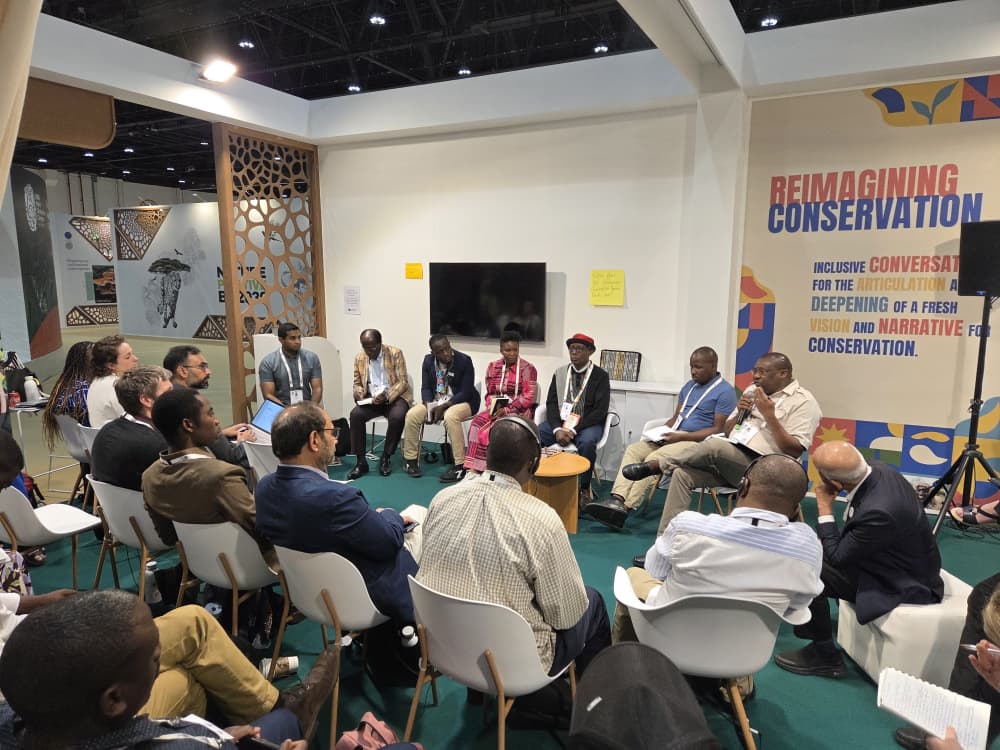
This session hosted by Maliasili explored conservation funding from the perspective of communities as primary investors in conservation and the enabling conditions required to make it successful. The session which included Maliasili partners included discussions on different aspect to funding including blended finance, establishing trust, local presence and networks to maximise conservation funding.
KWCA CEO started his reflection by sharing the news that GEF had made a ground breaking announcement that for the first time they’d offer grants of close to $300,000 to local CSOs. He said there was a shift by donors to fund organisations at the point of impact. Dickson emphasised “Targeted funding to communities should be prioritised instead of unrestricted competitive grants that require long application forms and reporting.”
According to Dickson, conservation is based on two flawed assumptions; conservation is bets achieved without people and communities are a threat and lack capacity. Yet, “capacity” is often equated with financing, and Africa remains grossly underfunded with only 1% of climate finance reaching Africa and only 5–10% of philanthropic funding supporting African-led initiatives (Maliasili study).
Dickson reflected on the need to sensitise donors and build their capacity to finance local CSOs. “Communities have their own in built, diverse capacities within and across the community that need further strengthening.” He added that the relationship between donors and communities should be based on trust. Donor support to IPLC is short and short term hence the need to increase their funding and make it long term if impact is to be achieved.
It was also noted that donor funding is focused on projects rather than capacity of the organisation to build their own resources. Locally led organisations are by-passed at inception of the project. “It’s important to get the resources to those that have the power to make action, focus on increased capacity to influence biodiversity positively rather than organizations that can manage funds”. Local conservation organizations should be direct recipients of these funds. “By investing in local CSOs we can achieve more with less funds”-Dickson Kaelo
